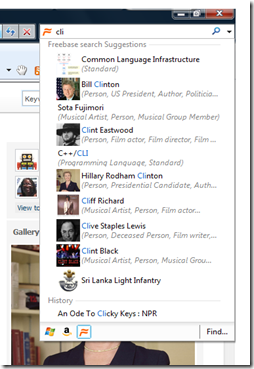Intro to Freebase
My evenings lately have been consumed exploring and tinkering with Metaweb’s Freebase. For those of you who have never heard of it, Freebase is a freely editable database that aspires to capture all of the world’s information in a structured, machine searchable format—sort of like Wikipedia, only for use by machines.
It has some serious potential, but as it currently stands, there a lot of work left to be done before it supplants IMDB and ancestry.com and MusicBrainz and every other collection of hyperlinked facts out there, but that’s what it’s trying to do.
You can already see it in action as an IMDB-style movie database or a genealogy browser (try out Moses or Noah or Queen Victoria), with more applications being developed against it every day. (In a future post, I’ll talk about Acre, their app development and hosting environment.)
My Freebase project
 Let me show you an Acre app that I’ve spent the last couple of evenings building: Visual Search support for Freebase.
Let me show you an Acre app that I’ve spent the last couple of evenings building: Visual Search support for Freebase.
Visual Search is an extension to Amazon A9’s OpenSearch specification that enables the search box in your browser to show you images inline with query suggestions. The first browser to support it will be Microsoft’s Internet Explorer 8, but inevitably the rest of the major browsers will follow suit because the feature is just that gorgeous.
You can install the search extension by pointing your browser at my Acre application which will talk you through setting it up.
One interesting feature of Acre is that all apps that it hosts are required to be BSD-licensed, so you can browse my source and even clone and modify my application. Disappointingly, they have made no effort for Acre’s app editor to support Internet Explorer, which makes me wonder if they understand what it will take to break into the mainstream from the Silicon-Valley-developer-centric niche that they’re currently occupying.
A whole lot more where that came from
Like the title indicates, I’m pretty hooked on Freebase right now, and have been diving in deep on how it works and how to build stuff (both data and apps) on top of it. I’ve collected a whole bunch of knowledge that’s not really written down very well anywhere, and I’d like to start collecting it here. Let me know if you have specific things that you’d like to see covered.
One Comment
Nice!